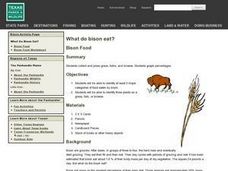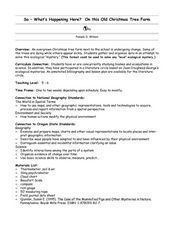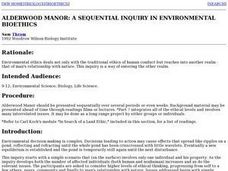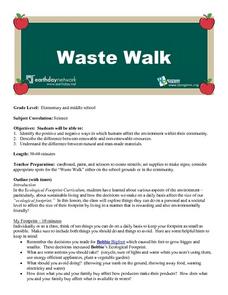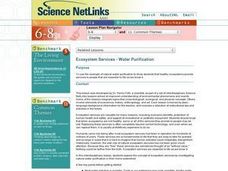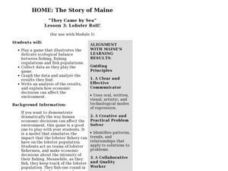Curated OER
Cooperation Course
Students explain cooperation is vital in our relationship to the environment and with fellow human beings. They develop cooperation skills through group interaction.
Curated OER
Biomes -- Part 1
Learners use the internet to locate and gather information on the world's biomes. They compare and contrast biomes to ecosystems and describe the human effects on ecosystems. They answer questions to end the lesson.
Curated OER
Fish Haunts
Students examine some of the different ecosystems that fish live in. While doing this they identify the species of fish and the ecological conditions needed for survival. Students use research resources to make fish cards that have...
Curated OER
Termitology
Students engage in an inquiry-based study of the ecology of termites. Through hands-on investigations, they explore the life cycle of termites, the termite's role in the food web, and the unique social structure of termite colonies.
Curated OER
Ecosystems: What Are They and How Do They Work?
Students explore the characteristics of major ecosystems, the interactions of the organisms within the systems, and the effects of humans on the system. Both living and non-living components are examined in this five lesson unit.
Curated OER
Are There Too Many Elk?
Students use information about elk populations in Arizona to make recommendations about population management. In this ecology lesson, students discover the problems associated with having a heard of elk that is too large. After...
Curated OER
Terraqua Column
Sixth graders create a TerrAqua column. In this ecosystems lesson, 6th graders build a TerrAqua column to conduct investigations on how living things impact the ecosystem.
Curated OER
Wetland Ecosystems: Non-living and Living Components and Brine Shrimp
Students explore wetland ecosystems. In this wetland lesson, students discuss and observe salt ponds and the organisms that live there. They explain how abiotic and biotic factors of species are important to survival.
Curated OER
Lunchroom Trash
Students explore the amount of waste produced by humans. In this ecology lesson, students predict which lunch bag and its contents will produce the most waste. Leftover material is examined, amounts are recorded, and a bar graph is...
Curated OER
Spring of Life
Students explore Florida's springs using video segments. In this video lesson plan, students examine Florida's springs ecosystem, the animals that live there and the red tide that threatens the environment. The lesson plan includes...
Curated OER
What do Bison Eat?
Middle schoolers identify the three major categories of food eaten by bison. In groups, they collect examples of grass and forbs and press them. They complete a chart of the percentages of each type of food the bison eat in a day. ...
Curated OER
Plugged in to CO2
Learners use a meter to measure the energy used and carbon produced by electronics and appliances. In this environmental science and technology lesson, students use a Kill-A-Watt meter to determine the electricity used by everyday...
Curated OER
Carbon Footprint Estimator
Students discover what a Carbon Footprint represents. In this sustainable lifestyle lesson plan, students determine their Carbon Footprint as an individual and as a class. Students use a the Internet to calculate how many earths it would...
Curated OER
So -- What's Happening Here? On this Old Christmas Tree Farm
Young scholars take a field trip to an old Christmas tree farm near their school. In groups, they gather data at the site and analyze the data in an attempt to discover what happened to the area. They identify human activities that led...
Curated OER
What is a Pest?
Students investigate whether rabbits should be considered pests even though they make good pets. They extend this to determine what, when, and where other organisms are considered to be pests, and examine why the concept of a pest is a...
Curated OER
Alderwood Manor: A Sequential Inquiry in Environmental Bioethics
Learners explore bioethics. They discuss the traditional ethics of human conduct and man's relationship with nature. Students identify ethical dilemmas. They discuss ramifications of economic and ecological concerns with bioethics.
Curated OER
Environment: Waste Walk
Students assess the positive and negative affects of humans on the environment. The lesson explores ways in which individuals and societies can reduce the negative impact on the environment. By taking a "waste walk" around their campus,...
Curated OER
Investigation of the Aral and Salton Seas
Students become more environmentally conscious. They see that it may be too late to "save" the Aral Sea, but there is still hope to prevent the ecological collapse of the Salton Sea.
Curated OER
Watershed Delineation
Students use topographic maps to delineate a watershed.In this ecology lesson, students draw the boundaries of a watershed onto a map using contour lines as a guide. Their resulting maps are used to evaluate their understanding.
Curated OER
The Arctic and Taiga Ecozone of Canada
Students discover the differences in the Arctic and Taiga regions of Canada. They identify physical and human characteristics of both region. They also practice using an atlas.
Curated OER
Terrestrial Ecozones, Population Density and Species at Risk
Tenth graders navigate and use the online Atlas of Canada. They explain the cause and effect relationship between human settlement and the natural environment and wildlife species. They utilize a worksheet imbedded in this plan.
Curated OER
Ecosytems: Water Purification
Middle schoolers explore how ecosystems purify water and what kinds of things humans do that alter these processes. They use a website to access information on local watersheds and develop a "river" newspaper
Curated OER
Lesson 3: Lobster Roll!
Students play a game that illustrates the delicate ecological balance between fishing, fishing regulations and fish populations. They collect data and analyze the results.
Curated OER
Cumulative Effects Assessment - What if?
Tenth graders discuss natural and human influences that may affect the ecological integrity of national parks. They study the concepts environmental assessments. In groups, they research a park's situation and present their findings at a...












